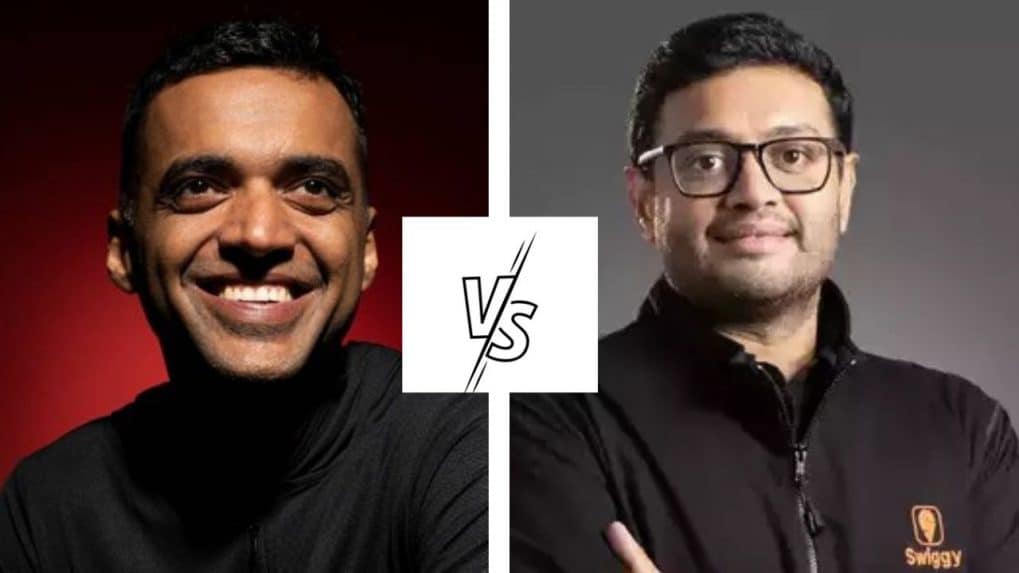Dynamic Deepinder vs Reclusive Majety: The fine line between influence and overexposure
Founders must take care to avoid overexposure, remembering that their role is to serve as custodians of the brand—a delicate balance that requires authenticity, humility, and a relentless focus on the long-term benefit of the company.
ADVERTISEMENT
Deepinder Goyal's recent Chief Of Staff job offer with a Rs 20 Lakh catch, appearance on The Kapil Sharma Show with his wife and viralised videos of his stint as a delivery executive, are a testament to the growing trend of CEOs embracing personal branding as a key tool for marketing. As the founder and CEO of Zomato, Goyal is part of a cadre of celebrity entrepreneurs — ranging from Elon Musk in the US to Ashneer Grover in India — who have effectively harnessed their public personas to solidify their influence. Whether their personal influence elevates or devalues their companies and brands depends on the nature and scale of their exposure.
Having said that, the rise of the founder/CEO as a public figure is reshaping the business landscape. Founders like Goyal have become not just the face of their companies, but symbols of the company's values and vision. The result is an emotional connection with customers who see beyond the product. In contrast, some founders, like Sriharsha Majety of Swiggy, prefer to maintain a quieter, more reserved public presence.
While both types of personas have found their own audiences, experts warn that the risks of being the loudest voice in the room often outweigh the advantages. High-profile founders like Musk, whose controversial actions have frequently made headlines, risk overshadowing the very companies they seek to promote. Tesla's fluctuating reputation, tied closely to Musk’s personal behavior, serves as a cautionary tale.
In contrast, figures like Steve Jobs and Ratan Tata had successfully woven their personal brand into the fabric of their companies, reinforcing both their legacies and the businesses they built. Their charisma and commitment to quality became integral to their brands' identities.
Lloyd Mathias, an angel investor and independent director, points out that while high-profile CEOs have long been a fixture in the West, this trend is relatively new in India. However, as startups proliferate, founders’ personal brands are becoming more deeply embedded in the fabric of their businesses. Whether it’s Grover, the former founder of BharatPe, Vijay Shekhar Sharma of Paytm, or the Kamath brothers of Zerodha, Indian founders are increasingly using social media as a tool to fuel business growth and visibility.
The evolution of the founder as a brand ambassador is not a new concept but has been amplified by the rise of social media and entertainment TV shows. Entrepreneurs across generations such as Richard Branson and Musk have transcended their roles as business leaders to become public personalities with vast followings. In India, family-owned dynasties like the Birlas, Ambanis, and Muthoots have similarly cultivated powerful public images.
Read more: Zomato's 'Food Rescue' feature sparks mixed reactions online
However, today’s "digital-native" founders, with diverse backgrounds and expertise, are keenly aware of how personal branding can amplify their businesses. Anup Sharma, a PR and strategic communications consultant, notes that these new-age entrepreneurs understand the power of social media and see personal branding as essential for building trust and visibility.
The Double-Edged Sword
While a CEO’s celebrity status can enhance brand visibility, it can also pose significant risks. The more a brand is associated with its founder, the more vulnerable it becomes if that figure faces personal controversy or public scrutiny. The downfall of high-profile leaders such as WeWork’s Adam Neumann, BharatPe’s Ashneer Grover, and Vijay Mallya of Kingfisher Airlines exemplifies the dangers of putting too much emphasis on the individual rather than the company itself.
Rutu Mody Kamdar, founder of Jigsaw Brand Consultants, warns that when a CEO becomes the face of the brand, any personal misstep can tarnish the entire business. Furthermore, this intense personal connection can create challenges when a founder steps back, potentially leaving a brand in limbo.
The Upside: Authenticity and Trust
Despite the risks, the benefits of strong personal branding are clear. A charismatic founder or CEO can humanize a company, creating a relatable narrative that fosters consumer trust. According to a LinkedIn study, 56% of professionals are more likely to make a purchase when an executive is active on social media, and 66% are more likely to recommend the brand. When founders share personal stories and challenges, they create a sense of authenticity that resonates with customers.
Founders like Aman Gupta of boAt, Anupam Mittal of Shaadi.com, Ghazal Alagh of Mamaearth, have successfully positioned themselves as thought leaders, using their visibility to build trust and loyalty in their respective industries. By presenting themselves as relatable, authentic figures, these leaders have turned their brands into much more than just companies—they’ve become movements, guided by personal values and mission. Yet, the threat of over-exposure looms large for all.
The Balancing Act
Chetan Mahajan, founder and CEO of The Mavericks, emphasizes that public relations (PR) plays a crucial role in shaping a CEO’s personal brand. A successful PR strategy ensures that the founder’s narrative aligns with the brand’s story, maintaining authenticity while enhancing the company’s reputation.
The key, Mahajan argues, is balance. “There’s no definitive ‘right or wrong’ persona for a founder; what matters is ensuring the brand has a soul and a relatable purpose,” he says.
Founders must take care to avoid overexposure, remembering that their role is to serve as custodians of the brand—a delicate balance that requires authenticity, humility, and a relentless focus on the long-term benefit of the company.
The crux of the matter, experts suggest, is clear: while a founder’s personal brand can be a powerful tool for business success, it must be wielded thoughtfully. The best CEOs understand that their role in brand-building is not to chase celebrity and fame, but to focus on authenticity, innovation, and long-term value.


